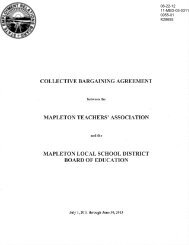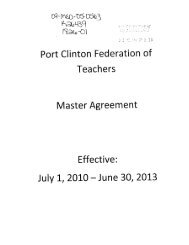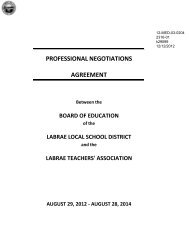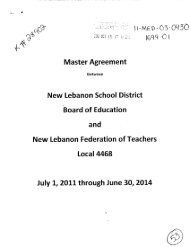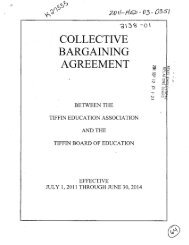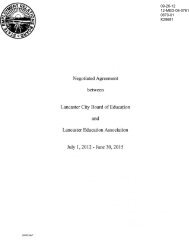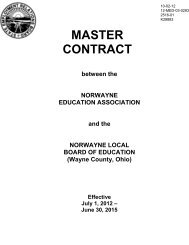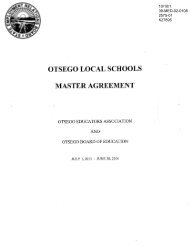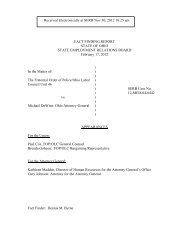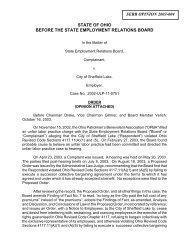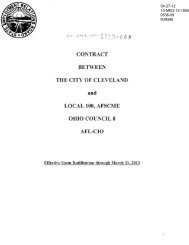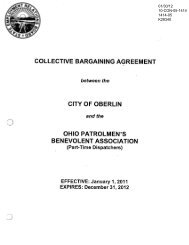Master Agreement 2005 - State Employment Relations Board
Master Agreement 2005 - State Employment Relations Board
Master Agreement 2005 - State Employment Relations Board
Create successful ePaper yourself
Turn your PDF publications into a flip-book with our unique Google optimized e-Paper software.
SYLLABUS<br />
for use with<br />
Appraisal of the Professional<br />
Revised - July 1986<br />
(Note: This <strong>Agreement</strong> calls for the redesign of the evaluation instrument and<br />
process described below.)<br />
Philosophy<br />
Thephilosophy underlying the development of the Appraisal of<br />
the Professional, ASteptoProfessional Growth,isinherentinthe<br />
title itself.<br />
Theessence of this philosophy is evident in the following list of<br />
statements:<br />
1. The appraisal system allows for the development of a close<br />
working relationship between the professional and the evaluator.<br />
The goal of professional and evaluator must be an authenticattempt<br />
to assist in professional growth and development.<br />
2. The professional appraisal system is linked to professional<br />
growth or improvementintheassigned area of responsibility.<br />
3. Focus of the professional appraisal system is to be on professional<br />
performance.<br />
4. The professional fills many roles, some of which are not limited<br />
to the classroom.<br />
5. Appraisal is to be conducted by the building administrator or<br />
other designated evaluator.<br />
6. The use of the evaluation instrument is flexible enough to<br />
meet the needs of all professional staff, regardless of assignment.<br />
7. Standards of effective performance should be established<br />
which are credible to the professional, undiminished by vague<br />
and loosely defined terms.<br />
8. The appraisal system provides a reasonable means with appropriate<br />
due process for terminating the employment of personnel<br />
who are not performing successfully.<br />
General Procedures<br />
The“appraisal of the professional” must be viewed as a process<br />
throughwhich professional performance is evaluated, plans for<br />
improvement of performance are formulated and recognition of<br />
success is formalized as a part of professional evaluation.<br />
In order to be responsive to the varied assignments of professional<br />
educators, the evaluation instrument must be interpreted as<br />
it relates to the professional’s assignment. “Teaching Performance,”<br />
for professionals performing their responsibilities in areas other<br />
than in the classroom, should reflect the effectiveness with which<br />
theindividual carries out his/her specific assignment.<br />
In theevaluation of guidance counselors, both the counselor<br />
and the evaluator should give due consideration to the unique role<br />
of the counselor. The document entitled “Guidance Services, K-12<br />
Written Guidance Program Plan,” dated August 1985, will be usefulinunderstanding<br />
the role of the counselor.<br />
Professional personnel who are not assigned to a specific school<br />
on a full-time basis will be evaluated by their supervisor and/or<br />
other professional who is knowledgeable about the individual’s performance<br />
in a given program or assignment. If the evaluator is a<br />
person other than the building administrator, the evaluator shall be<br />
identified to the professional at the time of assignment or prior to<br />
247



